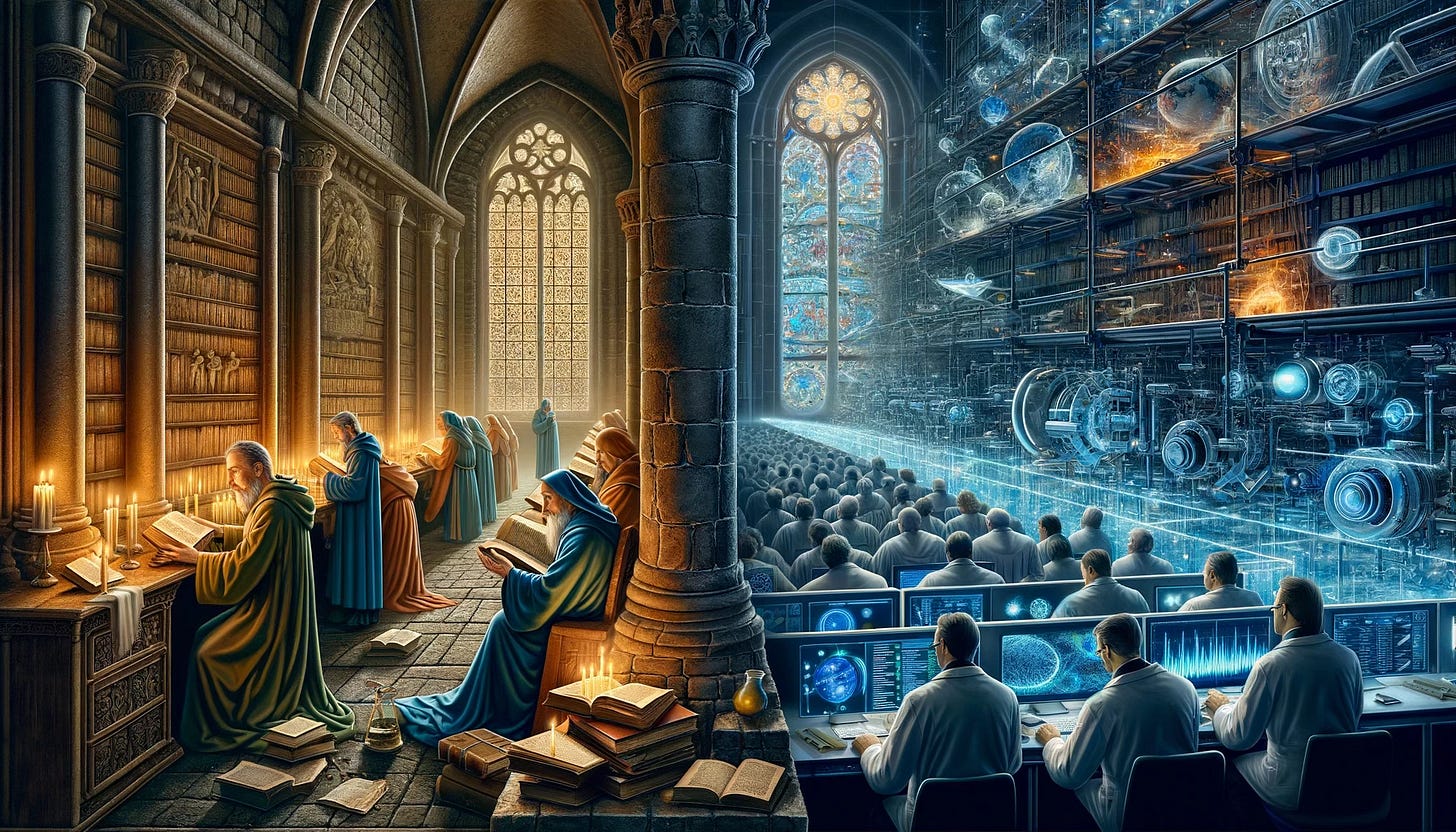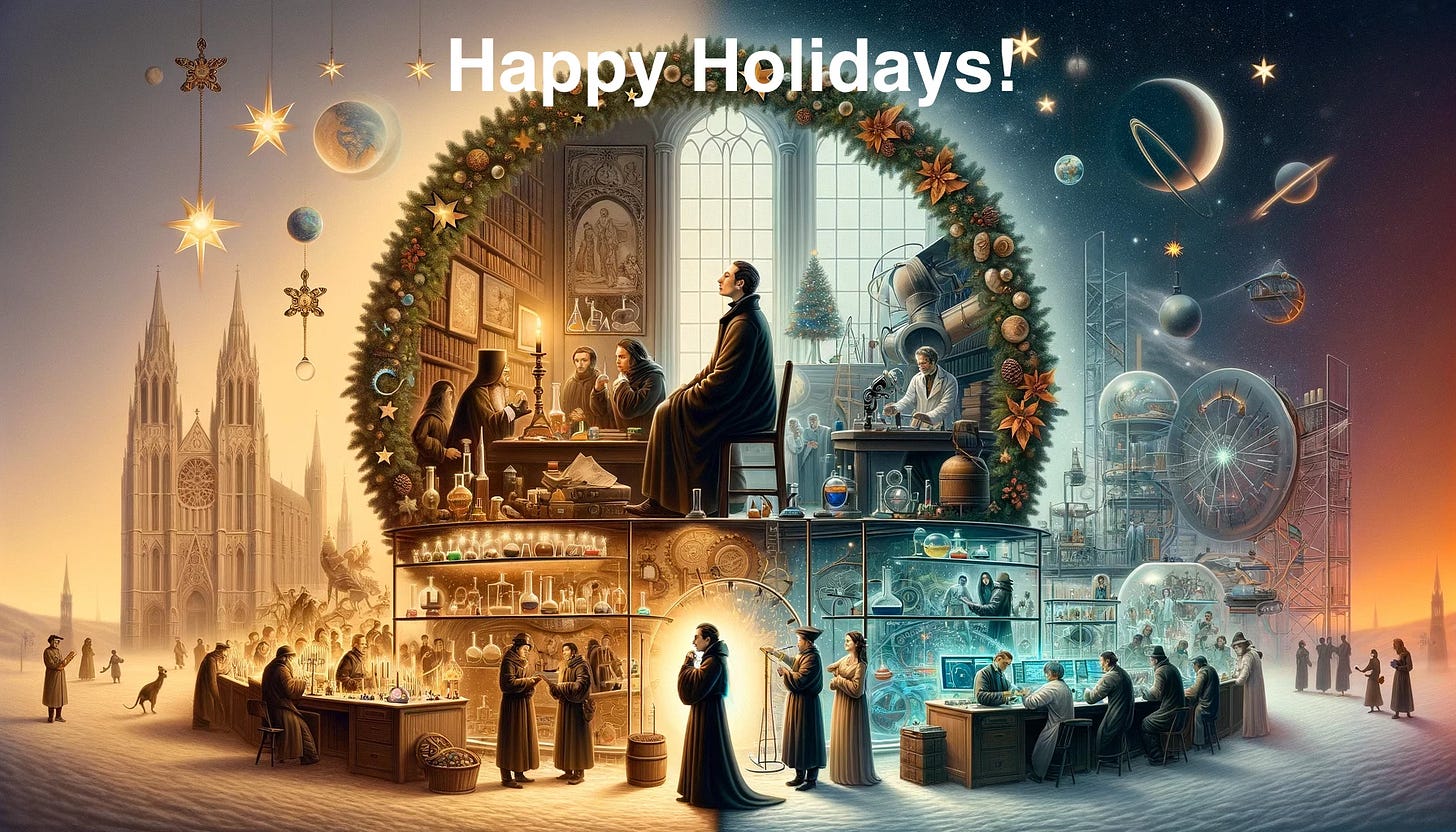From Scholasticism to Modern Ideology: The Quest for Absolute Truths and the Resistance to Counter Inquiry
Holiday Season Inspired Reflections on the Evolution of Objective Inquiry and the Challenges of Ideological Conformity
Considering the holiday season, a time for gratitude and contemplation, is upon us, it's fitting to explore and reflect on one of the most enduring human endeavors: the pursuit of truth. Over the past few centuries, this pursuit have taken us from the dialectical ethos of medieval scholasticism to the empirical rigor of modern science. This transformative journey has not only reshaped our understanding of the universe but also yielded tangible benefits for humankind. Modern science, with its resolute commitment to meticulous inquiry, has graced us with medical breakthroughs that have extended lifespans, technological innovations that have bridged vast distances and amplified communication, and environmental insights that have illuminated the path towards sustainability. However, this season of reflection also brings to attention a contemporary phenomenon: the reemergence of ideologically motivated "scientific truths" that echo the static, eternal truths of scholastic thought. Understanding the parallels between medieval scholasticism and today's ideologically driven knowledge approaches—particularly those resisting counterarguments and free inquiry—can be vital for continuing to foster novel scientific discoveries, unimpeded by ideological constraints, in the spirit of progress and prosperity for all.
Medieval Scholasticism: Theology and Philosophy Over Inquiry
In medieval scholasticism, the dialectical engagement was a method of structured debate used to explore and articulate established truths in accordance with theological and philosophical standards of the time. Scholastics believed in the existence of absolute truths, primarily rooted in religious doctrine and Aristotelian philosophy. The dialectical method involved presenting a thesis, an opposing antithesis, and reconciling them through rational argumentation to arrive at a synthesis. This process was not about discovering new truths but about delving deeper into and better understanding the truths already accepted as static and eternal. The goal of any debate was to resolve contradictions and clarify ambiguities within the framework of accepted knowledge, using dialectics as a tool for intellectual exploration within the immovable boundaries of established truths.
The Modern Quest for Truth and the Internet's Paradox
The modern quest for truth diverged sharply from medieval scholasticism, prioritizing empirical evidence, the scientific method, and technological progress to facilitate a more precise understanding of the natural world. Knowledge specialization increased and a secular worldview emerged. However, the internet, especially social media, introduced a paradoxical twist. While democratizing information access and fostering global discourse, social media also revived behaviors reminiscent of tribal dialectical thinking. Echo chambers and confirmation biases on many social media platforms can encourage a form of digital scholasticism, where users debate not to discover new ideas but to reinforce pre-existing beliefs, akin to medieval practices.
Contemporary Ideologically Motivated "Scientific Truths"
Today, ideologically motivated groups often promote their views as "scientific truths" on charged political and social topics, presenting them as absolute and unassailable. This mirrors medieval scholasticism's conception of static truths. Modern defenses of these "truths" often dismiss or attempt to censor counterarguments or new evidence, paralleling the scholastic defense of orthodox knowledge.
The scholastic reliance on authority discouraged questioning foundational premises, a tendency mirrored in today's ideological motivations. Resistance to counter inquiry prioritizes ideological conformity over everything else, including scientific curiosity. Additionally, while not as overt as in medieval times, contemporary societal and institutional pressures sometimes seem to oppose ideas deviating from accepted ideological narratives, which can be a moving target and incompatible with the foundational principles of modern science that values skepticism, open debate, and hypothesis testing.
Embracing Freedom of Inquiry for True Progress
The parallels between medieval scholasticism and the digitally-propagated scholasticism that defines ideologically motivated approaches to knowledge in some corners today are striking. Both prefer absolute truths over dynamic inquiry. However, the essence of science, in any era, is the freedom to explore, question, and revise our understanding. Embracing this freedom, rather than adhering to ideological absolutes, is the path to true understanding. As society navigates complex scientific and social issues, the spirit of inquiry and evidence-based reasoning must prevail over the comfort of ideological certainties.
As the new year unfolds, I’m personally inspired to deepen my commitment to the principles of continuous learning. I plan to enhance my approach to complex issues, pursuing a more tenacious level of inquiry and recognizing not just how things appear today but how they’ve come to be over the span of decades and centuries. I look forward to embracing the opportunities the new year presents and I’m enthusiastic about the valuable insights that await discovery.





Exactly. We need to create a culture where pointing to errors is the norm, so the errors can be better understood and avoided.